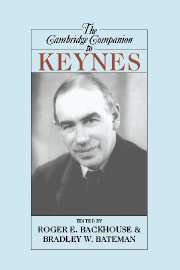Book contents
- Frontmatter
- 1 A cunning purchase: the life and work of Maynard Keynes
- 2 The Keynesian revolution
- 3 Keynes and the birth of modern macroeconomics
- 4 Keynes as a Marshallian
- 5 Doctor Keynes: economic theory in a diagnostic science
- 6 Keynes and British economic policy
- 7 Keynes and Cambridge
- 8 Keynes and his correspondence
- 9 Keynes and philosophers
- 10 Keynes’s political philosophy
- 11 Keynes and probability
- 12 The art of an ethical life: Keynes and Bloomsbury
- 13 Keynes and ethics
- 14 Keynes between modernism and post-modernism
- 15 Keynes and Keynesianism
- Bibliography
- Index
7 - Keynes and Cambridge
Published online by Cambridge University Press: 28 November 2006
- Frontmatter
- 1 A cunning purchase: the life and work of Maynard Keynes
- 2 The Keynesian revolution
- 3 Keynes and the birth of modern macroeconomics
- 4 Keynes as a Marshallian
- 5 Doctor Keynes: economic theory in a diagnostic science
- 6 Keynes and British economic policy
- 7 Keynes and Cambridge
- 8 Keynes and his correspondence
- 9 Keynes and philosophers
- 10 Keynes’s political philosophy
- 11 Keynes and probability
- 12 The art of an ethical life: Keynes and Bloomsbury
- 13 Keynes and ethics
- 14 Keynes between modernism and post-modernism
- 15 Keynes and Keynesianism
- Bibliography
- Index
Summary
. . . a tall man with an odd face and a restless eye, walking fast with a slight stoop up the aisle in Hall and holding on to the selvedge of his gown with both hands in front of him; pacing the Back Lawn with a companion in the summer; or hurrying across the Court with his black brief-case on the way to London.
H. G. Durnford, John Maynard Keynes, Cambridge: King’s College, 1949: 16. . . a kind and even simple heart under that immensely impressive armour of intellect.
V. Woolf, Moments of Being. 2nd edn. London: Hogarth Press, 1985: 198He was the greatest genius I ever met. His personal magnetism for young men, including myself, was unequalled. His charm, artistry and personality are such as I have never met in anyone else. He combined the scientist, artist and human moralist and man of affairs in a unique manner.
Meade 1990: 251PREFACE
Keynes's involvement with Cambridge was so deep and had so many dimensions that to write about it is a daunting task. This chapter approaches it from three directions. The first - and probably the simplest - is to provide a concise account of what Keynes did in Cambridge, summarizing those parts of his biography relevant to this topic (pp. 119-24). The second line leads to the issue of how Keynes was perceived by those close to him in Cambridge (pp. 124- 29). The number involved is too large to be dealt with in one paper, and I shall confine my considerations to those colleagues and pupils he was most in contact with. The sources on which this section is based are mainly correspondence and later recollections mainly by economists who were in Cambridge during Keynes's lifetime. Finally, I address a more general, but also more difficult, question, namely what Keynes meant to Cambridge economics, which he endowed with impetus, and of which he is still considered the leading player (pp. 129-32). It also addresses the issue of the so-called Keynesian tradition in economics, as synonymous with public expenditure and the welfare state.
- Type
- Chapter
- Information
- The Cambridge Companion to Keynes , pp. 118 - 135Publisher: Cambridge University PressPrint publication year: 2006
- 11
- Cited by

